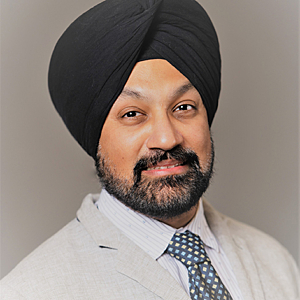Amarjit Manku

Digital Transformation Leadership
City of Surrey
IT Senior Project Manager
“Through the DTL program, my approach to projects has changed. Initially, due to my technical background, I used to focus narrowly on technology. This program helped me to look beyond my own area of expertise and consider the bigger picture.”
My Journey
As a project manager, I manage the IT portfolio for multiple projects involving servers, storage, networking, security, and cloud-related projects. I joined the MBA program in 2020, and the concept of digital transformation came up in various courses.
Digital transformation is changing the world, and the adoption of artificial intelligence and cloud technologies has accelerated the growth of organizations worldwide. Digital transformation is not limited to IT anymore. Instead, it is helping all the segments of an organization to transform and adopt a modern approach. Different departments and divisions in an organization are investing in various initiatives leading to digital transformation.
For example, I worked on a project in my previous organization where the engineering department used AI to capture data on water usage in different households to make decisions on future services and improvements. The executive leadership now recognizes that digital transformation has become mandatory to achieve excellence and stay competitive in today’s business world.
My experience at SFU Beedie
After completing my MBA, I received an invitation to join the DTL program. During the program, I had a breakthrough moment when I learned that the course concepts could be used to improve an existing process that was painful for the customers of the organization. Being in IT, my main focus was serving the internal departments in the organization. However, while reviewing the existing process, I found that it was the end customers, not the internal users, who needed help with the deficiencies of the current process. This realization motivated me to explore how we can improve the lives of end customers. The DTL program helped me identify the problems in the current process and gave me ideas for improving it.
What surprised me about the DTL program was that all the students were asked to bring their own real-world problems to the program. In contrast to my previous experience in the MBA program, where we were given case studies and problems from other organizations to work on, the DTL program gave us the opportunity to apply all the concepts we learned to solve our own problems. The program encouraged participants to look for problems in or outside their area. This approach was very beneficial because it helped me explore what is happening around me and what problems I can solve using the concepts learned in the program.
Every week, we were given assignments to present our work using the course concepts, and we also had to provide feedback on other participants’ presentations. It was helpful to see real-life problems and how people planned to tackle them using the concepts learned in the program. Overall, the program was a valuable experience. It helped me think outside the box and provided me with tools to develop practical solutions to real-world problems.
Highlights
One of the best parts of the program was the diverse range of industries represented, from healthcare and banking to education and government. This allowed everyone to share insights and problems unique to their industry or organization. I particularly appreciated learning from a group from the University of Central Asia. Every participant from that organization shared challenges like using an outdated curriculum and enrolling students in different countries. This experience showed me that digital transformation could truly transform the world and solve unique challenges faced by different regions and geographies.
Throughout the program, I learned about valuable tools such as the benefits dependency map and digital security model, which are now part of my toolkit for presenting to management and improving our organization’s strategy. Using these tools, we can achieve our transformation strategy more effectively.
Advice for future students
My advice for future students would be to be open-minded and prepared to challenge their beliefs. As I mentioned earlier, I used to believe that digital transformation was only related to IT, but now I understand that it can have implications in any industry. I suggest that prospective students take some time to reflect on the problems they are facing in their organizations and how they could potentially apply the concepts of the program to solve those problems. By bringing real-world problems to the table, they can make the most of their time in the program.

